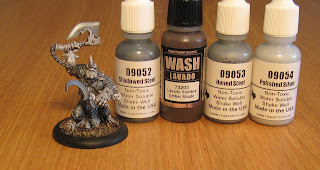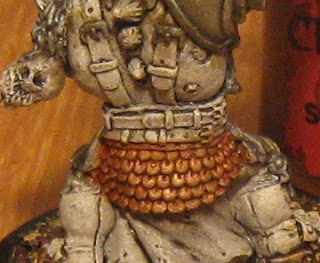Tutorial: Weathering Metal Armor
A couple of months back, I promised a tutorial on distressing and aging
metal without using weathering pigments. I was going to show this on
some Cryx Bane Knights. Well, here is the tutorial (finally), but on a
Bloodgorger model instead. Plenty of armor to weather here!

So, we start with the model assembled, primed white, inked black and based.
Normally, I'd work from the skin outwards, but there is so much metal on the figure there will be a lot of messy drybrushing. Best to do the metal first and then go back in and paint the skin and other details later.
For the iron armor, start with a very thin coat of Reaper Shadowed Steel. This is a bluish metallic, which creates a very nice undertone to work with. Keep all layers ultra thin...there will be plenty of them to build up the color.
Next, a wash of umber.
As you can see here, this creates the first layer of rusty grime.
A light drybrush of Honed Steel, which is the shade up from Shadowed Steel.
Then another light drybrush, this time with Polished Silver.
The silver drybrush pops out the rivets and plate edges.
And now add the final wash...this time sepia.
This is a lighter color than the underlying umber, so it adds some tonal contrast and sets up a nice base for the rust that will come later.
At this point add a final light drybrush of Polished Silver to accentuate edge wear on the steel plates.
Now move onto the bronze metal areas. For this, I wanted to try out the new GW series paints and their recommended progression for bronze. It starts with Screaming Bell (hate the new GW names). Screaming Bell is really red...it's more like a copper color than a bronze base...but what the hell.
This close up shows the color's tone.
Instead of GW's Reikland Fleshshade wash, which is recommended at this point in their bronze progression, I used my own gold wash, which is a mix of dark orange ink and matte medium.
This wash adds the appropriate shadows to the bronze base.
Next, a couple of GW layer paints, lightly drybrushed on. The first is Hashut Copper.
And the second is Sycorax Bronze.
These colors leave the bronze with a distinct reddish tone. I'd say it's more coppery than is should be...but that's just me.
The final step in the new GW progression is Golden Griffon, which is what they call a dry pigment. These "dry" colors are very thick, pigment-heavy pastes, which seem kind of like half-dried-out paint pots. Fine for drybrushing.
The bronze is brightened up a little at this point.
The final stage here is to add a light wash of sepia. This ties the bronze areas back in with the steel.
The final look of the bronze.
OK, time for a little rust application. Here are the Reaper and Vallejo colors used. As usual, these paints are cut with water and then a drop of rubbing alcohol is added to break surface tension. Dab the various tones onto the metal areas. Concentrate your dabs around rivets and in the folds of the plates.
This stage really ages the metal nicely.
Again, add a really light drybrush of silver at this point to bring the edge wear back up.
The silver drybrush can be added to the bronze areas as well to highlight their edges.
Add in blood splatters at this point. Load a brush tip with brown ink and then blow it onto the weapon edges, and lightly onto areas of the armor. Follow this up with red ink (again, blown off a brush tip).
Now our Bloodgorger looks like he's right in the middle of a fierce battle.
At this point, the metal is done. It is aged and weathered, and ready to go.
Go in and paint the skin (Reaper Olive Skin tones for this guy).
Leather, cloth, bone and the final gear details can be added at this point.
And there you have it. Hope you found this tutorial helpful.































No comments:
Post a Comment